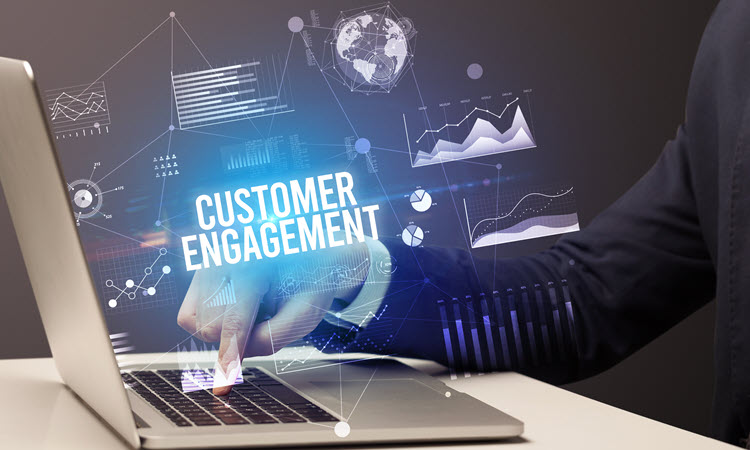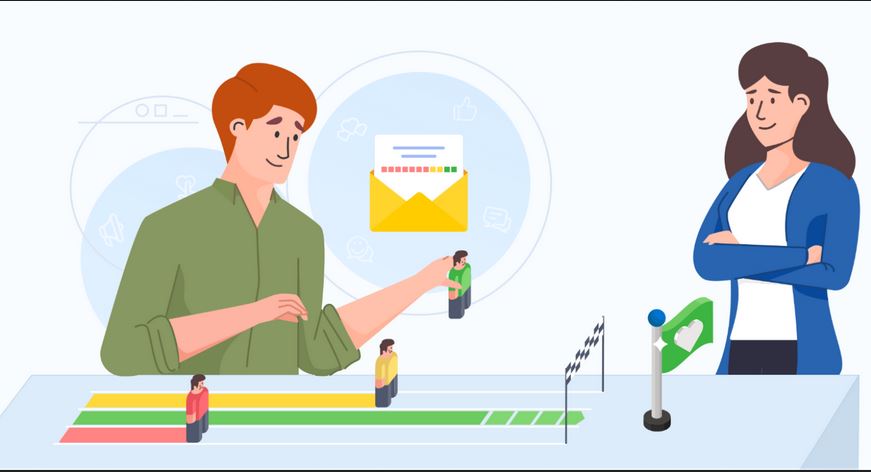
Imagine having a conversation with a business where you can get instant responses and support whenever you need it. That’s exactly what real-time engagement is all about. It’s like having a helpful friend by your side, ready to assist you without any delay.
Real-time engagement is super important because it allows businesses to connect and communicate with their customers in real time, making the whole experience more personal and interactive. You don’t have to wait hours or days for a reply. Instead, you get instant support and feedback, which is pretty awesome!
One of the great things about real-time engagement is that it gives businesses the power to address your concerns and answer your questions right away. Whether you’re chatting with a customer support agent or messaging a company on social media, they can help you out in real time. It’s like having your own personal assistant, ensuring that your needs are taken care of promptly.
Not only does real-time engagement make your experience smoother and more convenient, but it also shows that businesses genuinely care about their customers. When they respond quickly and provide timely assistance, it makes you feel valued and appreciated. Who doesn’t love that warm and fuzzy feeling?
In today’s fast-paced world, real-time engagement gives businesses a competitive edge. It sets them apart from the rest by showing their commitment to customer satisfaction. By being there for you in real time, they prove that they value your time and strive to deliver the best possible experience.
Benefits of Real Time Engagement In Businesses

Real-time engagement is crucial because it allows businesses to connect with their customers or users. Here are a few more reasons why real-time engagement is important for businesses:
Instantaneous Support
Real-time engagement enables businesses to address customer inquiries, concerns, or issues immediately. This timely assistance helps build customer satisfaction and loyalty by showing that their needs are a priority.
Enhanced Customer Experience
By engaging with customers in real-time, businesses can provide a seamless and personalized experience. Whether it’s through live chat, social media, text messaging, or real-time feedback mechanisms, customers feel valued and appreciated when their interactions are acknowledged and addressed promptly.
Quick Decision-Making
Real-time engagement allows businesses to gather feedback and insights from customers in real-time. This enables companies to make informed decisions faster, adapt their strategies, and address any emerging issues or trends promptly.

Increased Sales and Conversions
By engaging with customers in real-time, businesses can provide immediate assistance, answer product-related questions, and offer personalized recommendations. This level of interaction can lead to increased sales and conversions as customers feel more confident and supported in their buying decisions.
Competitive Advantage
In today’s fast-paced digital landscape, real-time engagement sets businesses apart from their competitors. By being responsive and available in real-time, companies demonstrate their commitment to customer satisfaction and their willingness to go the extra mile.
By leveraging real-time communication channels and actively engaging with others, businesses can foster trust, loyalty more sales, and ultimately drive growth.
Businesses That Are Already Using Real-Time Engagement To Their Advantage

Real-time engagement is like having a secret weapon that transforms the way businesses interact with their customers. Let’s take a peek into the real world and see how some clever businesses are using real-time engagement to their advantage.
E-commerce and Retail
Online retailers are using live chat support to engage with customers in real-time while they browse products or make purchasing decisions. This instant communication helps address customer inquiries, provide product recommendations, and resolve any issues, leading to higher customer satisfaction and increased sales.
Financial Services
Banks and financial institutions are implementing real-time engagement through chatbots or live chat to assist customers with account inquiries, transactions, and financial advice. Real-time interactions enable them to provide immediate support, answer queries, and guide customers through complex process, enhancing the overall banking experience.
Travel and Hospitality
The travel industry utilizes real-time engagement to offer personalized assistance to travelers. Hotels, airlines, and travel agencies use chat platforms and social media messaging to promptly address booking inquiries, flight updates, and travel-related concerns, ensuring a seamless and stress-free experience for their customers.
Software and Technology
Tech companies employ real-time engagement to provide technical support and troubleshoot issues faced by users. Through live chat, remote assistance, or screen sharing, they can quickly diagnose and resolve problems, minimizing downtime and improving user satisfaction.
Customer Service and Support
Many businesses across various sectors have incorporated live chat functionality on their websites to offer real-time support to their customers. This enables businesses to provide instant assistance, answer questions, and guide customers through the purchasing and sales process further, resulting in improved customer service and higher conversion rates.

So, if you’re ready to experience the magic of real-time engagement, it’s high time to join the ranks of these innovative businesses.
Real-time engagement channels such as WhatsApp, email, and text messages are revolutionizing the way businesses interact with their customers. These channels enable instant communication, allowing businesses to connect with customers in real-time.
Whether it’s resolving queries on WhatsApp, providing updates through email, or sending quick notifications via text messages, these real-time engagement channels ensure timely and convenient communication, enhancing the overall customer experience. Let’s dive deep into how these individual channels play their crucial part in customer engagement in real time.
Leveraging WhatsApp to Connect with Your Customers

Engaging with customers through WhatsApp has become a go-to approach for businesses seeking to establish meaningful WhatsApp connections and deliver tailored experiences. With its extensive user base of over 2 billion people, WhatsApp has emerged as a perfect platform for businesses to foster genuine connections with their customers.
Here’s a brief overview of customer engagement using WhatsApp:
-
Direct Communication
-
Notifications and Updates
-
Customer Support
-
Automated Messages
-
Broadcast Lists
-
Multimedia Sharing
-
Group Chats
-
Feedback and Surveys
Besides using WhatsApp independently for managing your business communications, you can also choose an efficient business management CRM that allows WhatsApp integration and offers more advanced features and scalability. This allows you to handle a higher volume of customer interactions on WhatsApp.
You’ll be amazed by the multitude of benefits that Real-Time Customer Engagement using WhatsApp, especially when integrated into the CRM system. It takes customer engagement to a whole new level, offering dynamic interactions and fostering stronger connections like never before on WhatsApp. Let me share the incredible ways WhatsApp integration amplifies this engagement manifold.
Read our blog on Power Of WhatsApp: Connect With Your Customers In Real-Time to know detailed information about the benefits of using WhatsApp for customer relationship management and engagement.
Benefits of Using Email for Real-Time Customer Engagement

Customer engagement using emails is a powerful strategy for businesses to connect with their customers and establish ongoing communication. Emails have long been a popular and effective channel for reaching a wide audience and delivering personalized messages.
Here’s a brief overview of customer relationship management and engagement using emails:
-
Personalized Communication
-
Newsletters and Updates
-
Transactional Emails
-
Promotional Campaigns
-
Surveys and Feedback
-
Drip Campaigns
-
Personalized Recommendations
-
Segmentation and Targeting
-
Opt-In and Opt-Out
Using CRM email integration offer businesses a powerful tool to enhance their customer interactions and nurture meaningful relationships to engage customers. It allows CRM data centralization of customers, automated communication, and message personalization, helping businesses foster stronger relationships with their customers and drive better business outcomes. It also manages and tags contacts for your ease so that you can easily differentiate each contact in your list.
At its core, CRM is all about understanding and serving customers better, and when combined with seamless email integration, it takes customer engagement to a whole new level. Really want to see the power of email integration?
Read our blog titled Unlocking the Potential of Email for Real-Time Customer Engagement. This insightful piece discusses numerous benefits of using email as a powerful tool for engaging with customers in real time. Moreover, it sheds light on how these benefits skyrocket when you integrate your email with CRM system.
Text Messages: A Powerful Tool To Increase Customer Engagement

Customer engagement using text messaging is a highly effective strategy for businesses to connect with their customers in a direct and personalized manner. Text messaging, also known as SMS (Short Message Service), allows businesses to engage with customers using their mobile devices, leveraging the convenience and widespread usage of texting.
Here’s a brief overview of customer engagement using automated SMS:
-
Instant Communication
-
Personalized Messaging
-
Notifications and Reminders
-
Promotions and Offers
-
Surveys and Feedback
-
Two-Way Communication
-
Appointment Scheduling
-
Short and Concise Marketing Messages
-
Opt-In and Opt-Out
If you choose automated SMS CRM integration, it enables businesses to manage customer interactions, automate personalized marketing, send messages out, streamline lead management, and provide timely updates. By leveraging SMS CRM system integration, businesses can increase customer engagement, improve communication efficiency, and foster stronger relationships with their customers.
To know more about the benefits of SMS CRM integration for businesses and customer contact management software free, read this blog titled Boost Efficiency and Productivity Using CRM With Text Messaging Integration. It discusses how SMS CRM integration actually improves real time customer engagement as well as contact management.
Common Challenges of Real-Time Customer Engagement and How To Overcome Them
Real-time customer engagement, which involves interacting with customers promptly and effectively, has become a crucial aspect of maintaining a competitive edge. However, this endeavor is not without its challenges.
Therefore, we will be exploring some common challenges businesses face when it comes to real-time customer engagement and providing actionable strategies to overcome them. By understanding and addressing these challenges head-on, businesses can enhance their customer interactions, improve customer satisfaction, and drive business growth. Let’s get started!
Challenge 1: Balancing Speed with Quality of Response
When engaging with customers in real-time, there is a constant need to strike a balance between providing quick responses and maintaining a high standard of quality and accuracy in the information provided.
Solution: Implementing automated systems and chatbots can help handle routine inquiries promptly, freeing up human agents to focus on more complex or sensitive customer issues. Additionally, providing agents with comprehensive training, access to knowledge bases, and predefined response templates can improve response quality while still maintaining speed.
Challenge2: Dealing with High Volume of Inquiries or Messages
Businesses often face the challenge of managing a large influx of customer inquiries or messages, which can overwhelm their customer support resources and lead to delays in response times.
Solution: Employing scalable customer engagement tools, such as ticketing systems and intelligent routing, can help efficiently manage and prioritize incoming messages. Automation and self-service options, such as FAQs and knowledge bases, can empower customers to find answers to common queries on their own, reducing the overall volume of incoming emails and inquiries.
Challenge 3: Ensuring Consistent Messaging and Brand Voice Across Channels
With customer engagement happening across multiple channels (e.g., social media, live chat, email), maintaining a consistent messaging tone and brand voice can be challenging.
Solution: Developing clear brand guidelines and communication protocols that align with the company’s values and voice is essential. Creating email templates, predefined responses, and training materials can help ensure consistent messaging across different channels. Regular training and communication with customer support teams can also reinforce the importance of maintaining brand consistency.
Challenge 4: Adapting to Evolving Customer Preferences and Behavior
Customer preferences and behavior are constantly evolving, making it crucial for businesses to adapt their engagement strategies accordingly to meet changing customer expectations.
Solution: Regularly monitor and analyze customer CRM data to gain insights into their preferences, communication channels of choice, and preferred engagement methods. Actively seek feedback from customers and conduct surveys to understand their changing needs. By staying agile and responsive to evolving customer behavior, businesses can adjust their customer engagement strategies effectively.
Challenge 5: Maintaining Data Privacy and Security
Real-time customer engagement involves handling sensitive customer information, making data privacy and security a significant concern.
Solution: Implement robust data protection measures, such as encryption, secure communication channels, and strict access controls. Comply with relevant data protection regulations, such as GDPR or CCPA, and ensure customer consent is obtained for data processing activities. Regularly audit and automatically update security protocols to stay ahead of potential threats.
Challenge 6: Avoiding Miscommunication or Misunderstandings
Communicating in real-time can increase the risk of miscommunication or misunderstandings between customers and store and support agents, leading to customer dissatisfaction.
Solution: Provide comprehensive training to support agents on effective communication techniques, active listening, and empathy. Utilize clear and concise language to avoid ambiguity. Leveraging chatbots with natural language processing capabilities can help interpret and respond accurately to customer queries, reducing the chances of miscommunication.
Challenge 7: Managing Customer Expectations for Response Times and Availability
Customers often expect immediate responses and 24/7 availability, which can be challenging to meet consistently.
Solution: Set clear expectations for response times and availability on different channels, communicating this information to customers upfront. Use automated acknowledgments to assure customers that their queries have been received and will be addressed within a specified timeframe. Proactively manage customer expectations through transparent communication and updates on any potential delays.
Challenge 8: Ensuring Compliance with Regulations and Laws Related to Customer Engagement
Businesses need to navigate and comply with various regulations and laws governing customer engagement, such as TCPA, CAN-SPAM Act, or local privacy regulations.
Solution: Stay updated with relevant regulations and laws in the jurisdictions where the business operates. Develop policies and procedures that align with legal requirements, ensuring consent management, unsubscribe mechanisms, and compliance with opt-in/opt-out preferences. Regularly review and update process to ensure ongoing compliance.
Challenge 9: Building and Maintaining a Skilled and Responsive Customer Support Team
Having a skilled and responsive customer support team is vital for effective real-time customer engagement, for example, but it can be challenging to attract, train, and retain talent.
Solution: Invest in comprehensive training programs that equip support agents and sales reps with the necessary skills and product knowledge. Foster a positive work environment that encourages continuous learning and professional development. Implement performance metrics and feedback mechanisms to monitor agent performance and provide ongoing coaching and support.
Challenge 10: Managing the Cost and Resources Required for Real-Time Customer Engagement
Real-time customer engagement can require significant investments in technology, infrastructure, and personnel, posing cost and resource management challenges.
Solution: Conduct a cost-benefit analysis to determine the optimal allocation of resources for customer engagement. Explore cost-effective solutions such as cloud-based customer engagement platforms that provide scalability and flexibility. Continuously monitor and evaluate the return on investment (ROI) of customer engagement initiatives to ensure efficient resource allocation.
By proactively addressing these challenges and implementing the recommended solutions, businesses can overcome the obstacles associated with real-time customer engagement and build stronger, more meaningful relationships with their customers.
Some Smart Tips for Successful Real-Time Customer Engagement

Effectively engaging with customers in real-time requires careful planning and execution. In this context, smart tips for successful real-time customer engagement can be invaluable. These tips can help businesses navigate the challenges of real-time customer engagement and leverage the opportunities presented by this mode of customer interaction.
By following these tips, businesses can establish themselves as customer-centric organizations that provide exceptional service and support to their customers.
1. Respond Promptly and Provide Helpful Information
Responding to customer inquiries in a timely manner is crucial for successful real-time customer engagement. Businesses should ensure that their support team is trained to provide helpful and accurate information that addresses customer needs and queries.
2. Use a Personalized Approach that Addresses the Customer’s Specific Needs and Preferences
A personalized approach that takes into account individual customer preferences and needs can help build stronger customer relationships. Businesses should use customer data and insights to tailor their own messaging campaigns and support accordingly.
3. Choose the Right Communication Channels that Match Your Customer’s Preferences
Different customers and clients have different preferences when it comes to communication channels. Businesses should identify and use the channels that are most relevant and convenient for their customers.
4. Ensure Consistency in Your Messaging and Branding Across All Communication Channels
Consistency in messaging and branding across different communication channels can help build trust and reinforce brand identity. Businesses should develop and adhere to clear messaging and branding guidelines.
5. Train Your Support Team to Handle Real-Time Communication Effectively
Effective communication skills are essential for support agents who engage with customers in real-time. Businesses should provide comprehensive training to their support team to help them handle real-time communication effectively.
6. Use Automation to Improve Response Times and Accuracy
Automation can help improve response times and accuracy by enabling businesses to quickly respond to routine customer inquiries. Chatbots, autoresponders, and other automated tools can be used to handle simple and repetitive queries.
7. Utilize Analytics to Understand Customer Behavior and Preferences
Analytics can provide valuable insights into a customer’s journey, behavior and preferences. Businesses should use data analytics to understand customer needs, preferences, and pain points and to tailor their own messaging campaigns and support accordingly.
8. Actively Seek and Listen to Customer Feedback to Improve Your Real-Time Engagement Strategy
Customer feedback can provide valuable insights into the effectiveness of real-time engagement strategies. Businesses should actively seek feedback from their customers and use it to improve their engagement strategy.
9. Develop a Comprehensive Crisis Management Plan to Handle Unexpected Events
Unexpected events such as system outages, product recalls, or natural disasters can disrupt real-time customer engagement. Businesses should have a crisis management plan in place to handle such events and to communicate effectively with customers.
10. Maintain Data Privacy and Security by Complying with Regulations and Industry Standards
Data privacy and security are critical for real-time customer engagement. Businesses should comply with regulations and industry standards and use secure communication channels to protect customer data.
11. Continuously Improve Your Engagement Strategy by Keeping up with the Latest Trends and Technologies
Real-time customer engagement is a dynamic field that requires businesses to stay up-to-date with the latest trends and technologies. Businesses should continuously review and update their engagement strategy to ensure that it remains effective and relevant.
Building Strong Customer Relationships Using EQUP
EQUP CRM is a premium all-in-one CRM (Customer Relationship Management) software as it encompasses various capabilities and typical features of CRM software.
EQUP CRM allows businesses to collect, store, and manage customer data in a centralized database. It enables businesses to keep track of customer interactions, purchase history, preferences, and other relevant information.
It also provides tools for organizing and managing customer contacts. It allows businesses to maintain a comprehensive database of customer information, including contact details, communication history, and relationship status. You can also manage your WhatsApp account and WhatsApp users.
Sales and Opportunity Management features of EQUP CRM assist in managing the sales pipeline and tracking opportunities. It enables businesses to monitor new leads often, track sales activities, forecast revenue, and manage deals from prospecting to closure.
You can also streamline email marketing and campaigns through the marketing automation feature available in EQUP CRM. It helps businesses automate marketing tasks, such as email campaigns, lead nurturing, SMS marketing messages and campaign analytics, to engage with customers effectively.
Several customer service and support features, such as ticket management, case tracking, and issue resolution make it one of the best CRM platforms in the industry. It facilitates efficient customer support process, ensuring timely and effective resolutions.
One thing that makes it a complete solution is its analytics and reporting functionalities that help in gaining insights into customer behavior, sales performance, and even marketing efforts’ effectiveness. EQUP CRM enables businesses to measure key metrics, identify trends, and make data-driven decisions.
Besides everything, one thing that makes EQUP CRM a unique solution is that it supports integration with other business systems, such as your email accounts, e-commerce platforms, and third-party applications, to enhance functionality and streamline data flow. It also offers customization options to tailor the software to specific business needs.
Overall, EQUP as an all-in-one CRM software combines various best CRM system functionalities, enabling businesses to effectively manage customer relationships, drive sales, provide excellent customer service, and make data-driven decisions.